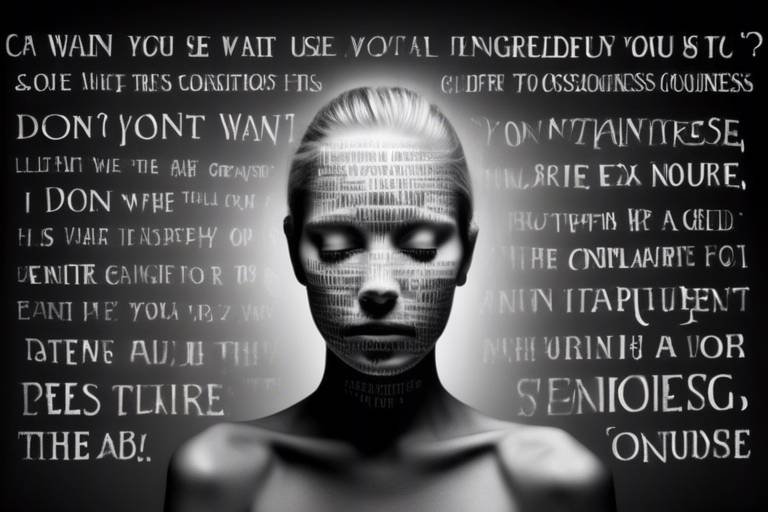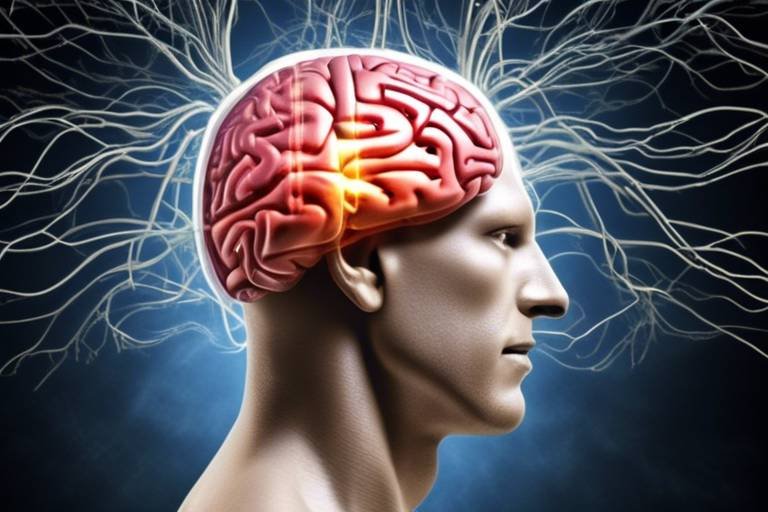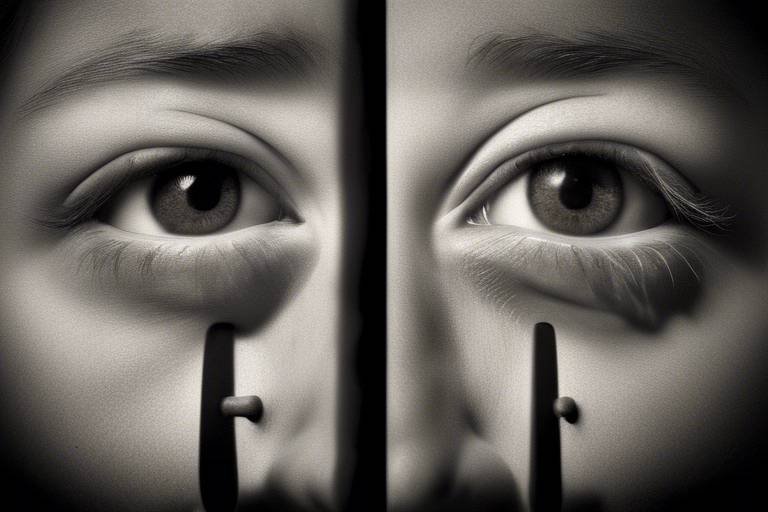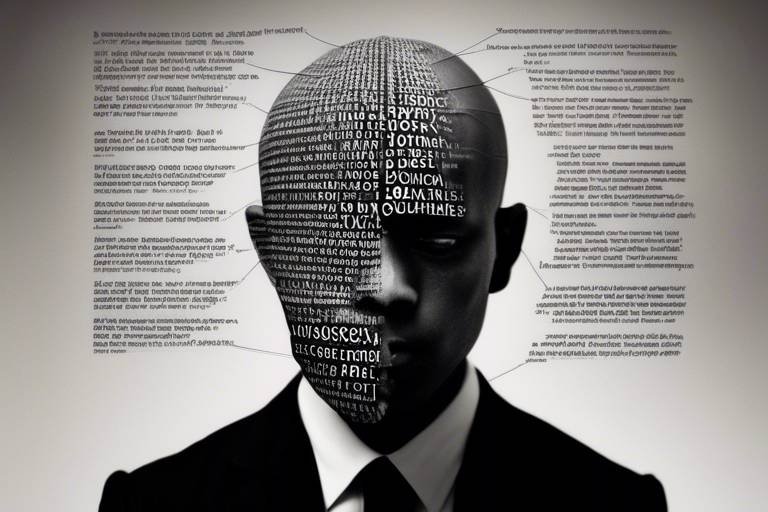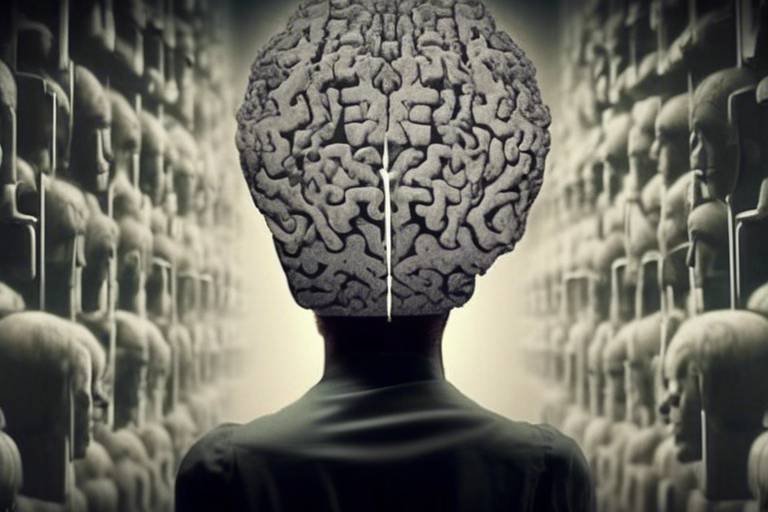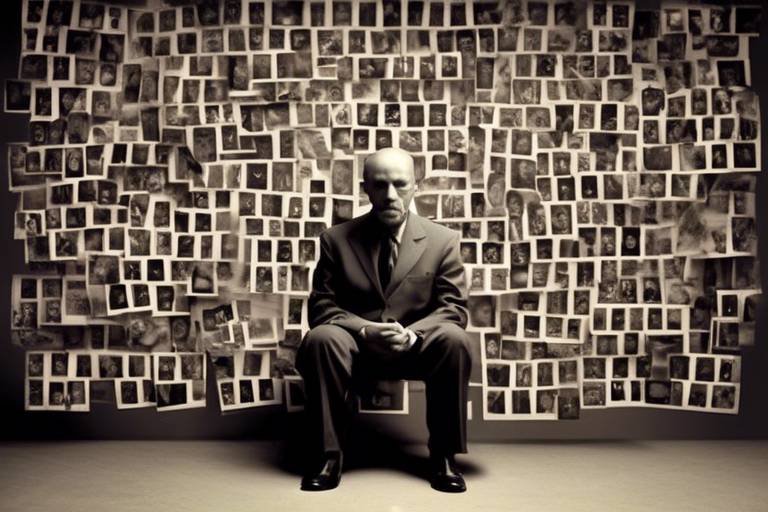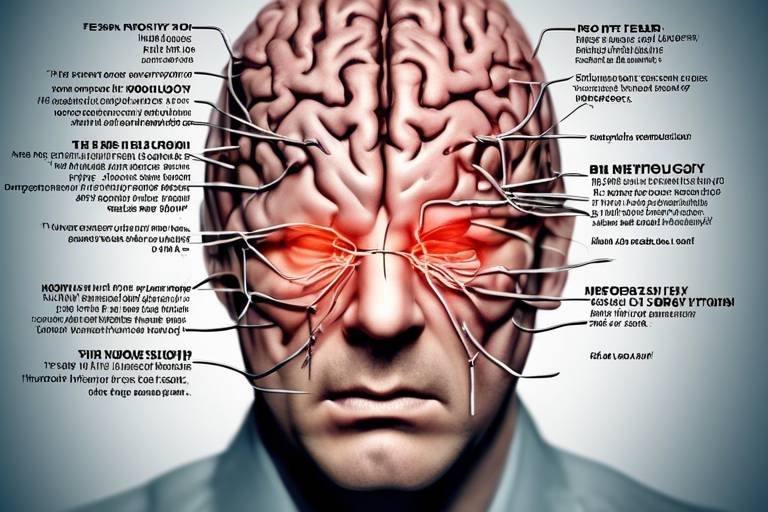The Hidden Depths of the Unconscious Mind
Exploring the intricate layers of the unconscious mind reveals its profound influence on our thoughts, emotions, and behaviors. It's like diving into an ocean of hidden treasures, each wave representing a different aspect of our psyche. While we may think we are fully aware of our feelings and decisions, much of what drives us lies beneath the surface, waiting to be discovered. In this article, we’ll delve into the fascinating world of the unconscious, uncovering its mysteries and understanding how it shapes our daily lives.
Understanding what constitutes the unconscious mind helps us appreciate its role in our daily lives. Imagine your mind as an iceberg; what you see above the water is just a small fraction of what lies below. The unconscious influences decisions and shapes our identities without our conscious awareness. It holds our repressed memories, forgotten experiences, and even the emotions we might not want to confront. This hidden layer can impact everything from our relationships to our career choices, often steering us in directions we might not consciously choose.
Various psychological theories offer insights into the structure and function of the unconscious mind. From the pioneering work of Freud to contemporary interpretations, the unconscious has been a subject of fascination and debate. Understanding these theories can provide a roadmap for navigating our inner worlds. Here’s a brief overview of some key perspectives:
| Theory | Key Concepts |
|---|---|
| Freudian Theory | Focus on repression, dreams, and unconscious desires. |
| Cognitive Psychology | Explores unconscious processing of information and decision-making. |
| Neuroscience | Studies brain mechanisms behind unconscious thoughts and behaviors. |
Sigmund Freud's theories laid the groundwork for understanding the unconscious. He emphasized the importance of repressed memories and desires in shaping human behavior and personality. Freud believed that these hidden elements could surface in various ways, often causing anxiety or distress. He viewed the unconscious as a reservoir of thoughts and feelings that we are not actively aware of, yet they profoundly affect our actions and interactions.
Repression serves as a key defense mechanism, allowing individuals to manage anxiety by pushing distressing thoughts out of conscious awareness. It's like putting a lid on a boiling pot; eventually, the pressure builds up and can lead to an explosion of emotions or behaviors. This can impact mental health and relationships, as unresolved issues may resurface in unexpected ways.
Freud believed that dreams provide a window into the unconscious, revealing hidden desires and conflicts. Analyzing dreams can be akin to deciphering a secret language, where symbols and narratives offer insights into our deepest fears and aspirations. By interpreting these dreams, we can gain a better understanding of our psychological landscape and address underlying issues.
Modern psychology has expanded on Freud's ideas, incorporating neuroscience and cognitive psychology to explore how the unconscious mind operates. Today, we understand that the unconscious is not merely a storage space for repressed thoughts but an active participant in our decision-making processes. This evolving perspective allows us to appreciate the complexities of the unconscious mind and its implications for our behavior.
Research shows that the unconscious mind plays a crucial role in decision-making processes. Often, our choices are guided by intuition and past experiences rather than rational thought. This can lead us to make quick decisions based on gut feelings, which are informed by our unconscious processing of information. But why does this happen? It's because our brains are wired to recognize patterns and make associations, often without our conscious awareness.
Implicit biases, formed unconsciously, affect our perceptions and judgments. These biases can lead to unintended consequences in social interactions and decision-making scenarios. For instance, a hiring manager may unknowingly favor candidates who share similar backgrounds or characteristics, impacting diversity in the workplace. Recognizing these biases is the first step toward addressing them and making more informed decisions.
Intuitive decisions often stem from unconscious processing, where accumulated experiences inform our gut feelings. Think of it as having a built-in GPS that guides you based on previous journeys. While it may not always lead you to the right destination, trusting your intuition can sometimes yield surprising results. Understanding the source of these gut feelings can help us navigate our choices more effectively.
The unconscious mind significantly impacts mental health. Unresolved conflicts and repressed emotions can lead to psychological disorders, affecting overall well-being. It’s essential to recognize that what we bury deep within us can manifest in various ways, sometimes as anxiety, depression, or even physical ailments. Addressing these issues is crucial for maintaining mental health and fostering personal growth.
Various therapeutic approaches, including psychoanalysis and cognitive-behavioral therapy, aim to bring unconscious thoughts and feelings to consciousness. These therapies serve as tools to help individuals uncover the roots of their issues, promoting healing and self-awareness. By shining a light on the unconscious, we can begin to understand and resolve the conflicts that may be holding us back.
Engaging in self-reflection can help individuals uncover unconscious patterns. This practice fosters personal growth and improves mental health by addressing underlying issues. Taking the time to reflect on our thoughts, feelings, and behaviors allows us to gain insights into our motivations and desires, ultimately leading to a more fulfilling life.
- What is the unconscious mind?
The unconscious mind is a part of our mental processes that we are not actively aware of, yet it influences our thoughts, feelings, and behaviors. - How does the unconscious mind affect decision-making?
It often guides our choices based on intuition and past experiences, rather than rational thought. - Can therapy help with unconscious issues?
Yes, therapeutic approaches can help bring unconscious thoughts and feelings to the surface, promoting healing and self-awareness.

The Nature of the Unconscious
Understanding the nature of the unconscious mind is like peering into a vast ocean, where only the surface is visible while the depths are teeming with hidden treasures. The unconscious mind encompasses all the thoughts, memories, and desires that lie beneath our conscious awareness, influencing our actions and reactions in ways we often do not realize. It's a powerful force that shapes our identities, guiding us through daily life without us even being aware of its presence. Imagine driving a car on a familiar route; your conscious mind is focused on the road, but it's your unconscious that navigates the turns, remembers the landmarks, and even reacts to sudden changes in traffic.
This hidden layer of our psyche plays a crucial role in how we process information and make decisions. Every experience we have leaves an imprint on our unconscious, which then influences our behavior and choices in subtle yet profound ways. For instance, think about the last time you had a gut feeling about something. That instinctual reaction often stems from accumulated knowledge and experiences stored away in the unconscious mind, guiding you toward a decision before your conscious mind can even catch up.
Moreover, the unconscious is not just a passive repository of forgotten memories; it actively shapes our perceptions and interactions with the world. It can be likened to a silent partner in a business venture, always working behind the scenes to influence outcomes. This influence can manifest in various ways, such as:
- Emotional Responses: Our feelings about certain situations or people can often be traced back to unresolved issues or past experiences stored in the unconscious.
- Behavioral Patterns: Repeated behaviors, whether positive or negative, often stem from unconscious beliefs and attitudes formed over time.
- Decision-Making: Many of our choices are guided by unconscious processes, leading us to act intuitively rather than analytically.
In essence, the unconscious mind acts as a filter through which we interpret our experiences. It holds not only our fears and desires but also our biases and prejudices, which can significantly affect our interactions with others. Understanding this intricate layer of our psyche is crucial for personal development and emotional well-being. By bringing unconscious thoughts and feelings to light, we can begin to unravel the complexities of our identities and make more informed choices.
As we delve deeper into the workings of the unconscious, it becomes clear that this hidden realm is essential for understanding ourselves and navigating the complexities of life. Just as a ship relies on a compass to find its way through uncharted waters, we too can benefit from exploring the depths of our unconscious to gain clarity and direction in our lives.
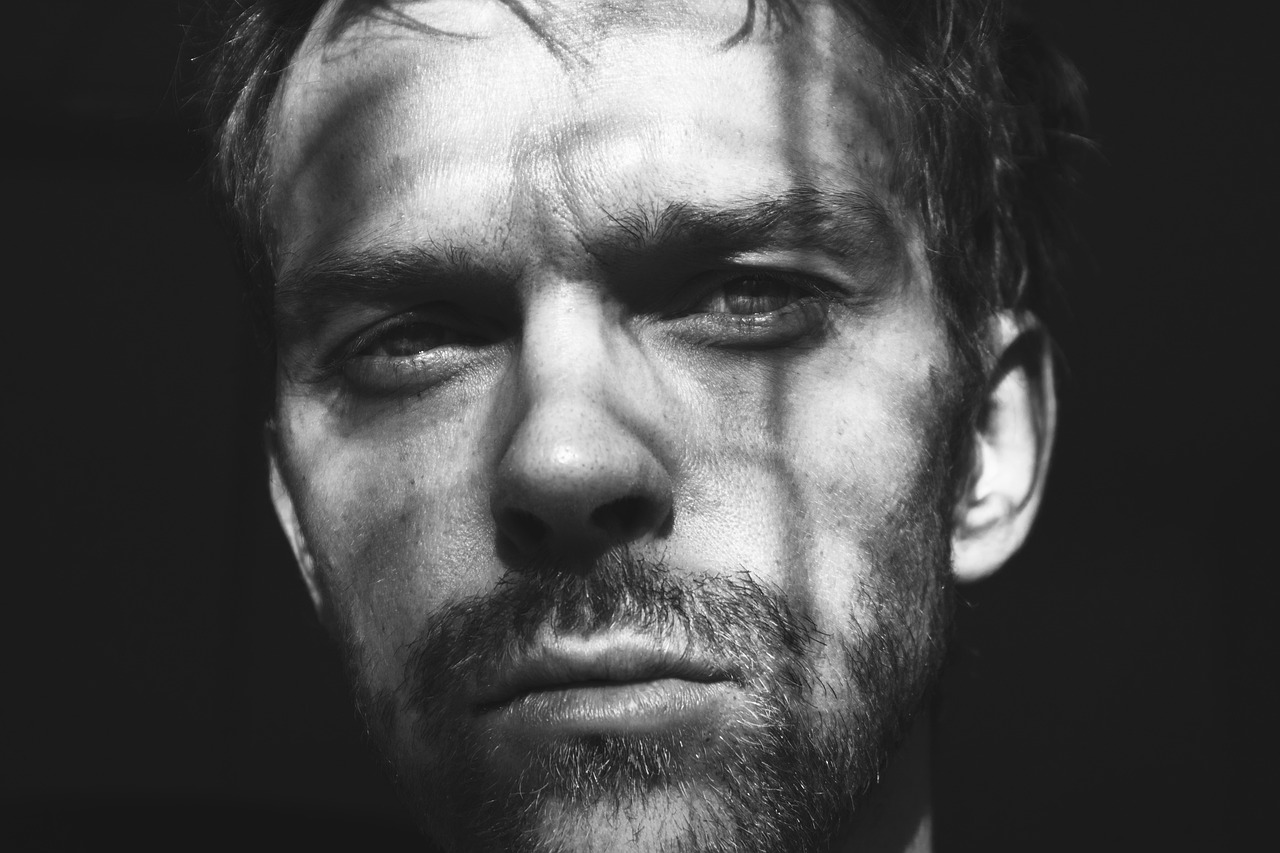
Theories of the Unconscious
When we dive into the realm of the unconscious mind, we find ourselves navigating through a complex web of theories that attempt to explain its nature and function. Understanding these theories is crucial because they help us appreciate how our unconscious influences our daily lives, often in ways we might not even realize. From the pioneering work of Sigmund Freud to contemporary psychological insights, the exploration of the unconscious mind reveals a fascinating interplay between our hidden thoughts and our overt behaviors.
Freud's theories, for instance, serve as the cornerstone of our understanding of the unconscious. He proposed that our unconscious is a reservoir of repressed memories, unacknowledged desires, and unresolved conflicts. This idea suggests that much of our behavior is driven by forces outside of our conscious awareness. Freud categorized the unconscious into three parts: the id, ego, and superego, each playing a distinct role in shaping our personality and actions. The id represents our primal instincts, the ego mediates between our desires and reality, while the superego embodies our moral compass. This dynamic interaction can lead to internal conflicts, often manifesting in anxiety or neuroses.
As we move beyond Freud, we encounter various modern interpretations that build upon his foundational ideas. For example, contemporary psychologists have integrated findings from neuroscience, which reveals that much of our decision-making occurs at an unconscious level. Research shows that our brains process information and make judgments before we even become aware of them. This is where theories like dual-process theory come into play, suggesting that we operate using two systems: the fast, intuitive system and the slower, more deliberate system. This duality highlights the complexity of our cognitive processes and how the unconscious mind contributes to our everyday choices.
Moreover, the unconscious mind's influence extends into realms such as creativity and problem-solving. Theories suggest that when we allow our minds to wander, we tap into our unconscious, which can lead to unexpected insights and innovative solutions. This phenomenon is often referred to as "incubation," where stepping away from a problem allows our unconscious to work on it, leading to breakthroughs when we least expect them. Such insights remind us that the unconscious isn't merely a dark void but a vibrant source of creativity and intuition.
In summary, the theories surrounding the unconscious mind are as diverse as they are profound. From Freud's foundational concepts to contemporary insights that merge psychology with neuroscience, understanding these theories enriches our comprehension of human behavior. We learn that the unconscious is not just a passive repository of forgotten memories, but an active participant in shaping our thoughts, emotions, and actions. As we continue to explore these theories, we uncover the hidden depths of our minds, revealing the powerful forces that drive us.

Freudian Perspectives
Sigmund Freud, the father of psychoanalysis, opened the floodgates to understanding the unconscious mind through his groundbreaking theories. He proposed that our unconscious is a vast reservoir filled with repressed memories, desires, and unresolved conflicts. Imagine it as an iceberg, where only a small portion is visible above the surface, while the majority lies hidden beneath. This hidden part influences our thoughts and behaviors in profound ways, often without our conscious awareness.
Freud emphasized that the unconscious mind is not merely a passive storage of memories; rather, it actively shapes our personalities and behaviors. He introduced the concept of repression, a defense mechanism that protects us from anxiety by pushing distressing thoughts and memories out of our conscious awareness. Think of repression as a safety valve, allowing us to function in daily life while keeping painful experiences at bay. However, this mechanism can have unintended consequences, leading to emotional turmoil and dysfunctional behaviors.
One of Freud's most intriguing ideas was that dreams act as a gateway to the unconscious. He believed that dreams are not just random images but rather a reflection of our deepest desires and conflicts. In his view, analyzing dreams can unveil the hidden meanings behind our thoughts and behaviors. For instance, if someone dreams of falling, it might symbolize feelings of insecurity or loss of control in their waking life. By interpreting these dreams, individuals can gain valuable insights into their psychological issues and work towards healing.
Freud's theories also laid the groundwork for understanding various psychological phenomena. His exploration of the id, ego, and superego illustrates the dynamic interplay between our primal instincts, rational thoughts, and moral values. The id represents our basic desires and urges, while the ego mediates between our instincts and the realities of the world. The superego, on the other hand, embodies our moral conscience, often leading to internal conflicts. This triadic model helps us understand why we sometimes feel torn between our desires and societal expectations.
While Freud's ideas have faced criticism and evolved over the years, they remain influential in the field of psychology. His emphasis on the unconscious mind has paved the way for modern therapeutic approaches that seek to uncover hidden emotions and unresolved conflicts. By bringing these unconscious elements into consciousness, individuals can work through their issues and foster personal growth.
In summary, Freud's perspectives on the unconscious mind have profoundly impacted our understanding of human behavior. His theories invite us to explore the deeper layers of our psyche, encouraging us to confront the hidden aspects of ourselves that shape our experiences and relationships. As we delve into the complexities of the unconscious, we may uncover insights that lead to greater self-awareness and emotional well-being.
- What is the unconscious mind? The unconscious mind is a part of our psyche that contains thoughts, memories, and desires that are not currently in our conscious awareness but still influence our behavior.
- How does repression work? Repression is a defense mechanism that involves pushing distressing thoughts and memories out of conscious awareness to protect the individual from anxiety.
- Why are dreams important in Freudian theory? Freud believed that dreams provide insight into our unconscious desires and conflicts, serving as a valuable tool for understanding our psychological issues.
- What are the id, ego, and superego? These are the three components of Freud's model of the psyche: the id represents primal urges, the ego mediates between desires and reality, and the superego embodies our moral conscience.

Repression and Defense Mechanisms
Repression is one of the most fascinating concepts in psychology, acting as a protective shield for our mental well-being. Imagine your mind as a vast ocean, where the conscious thoughts are like the surface waves, visible and easy to navigate. Below this surface lies the deep, dark waters of the unconscious, where repressed memories and emotions swirl around, often hidden from our awareness. This mechanism works tirelessly to keep distressing thoughts at bay, allowing us to function in our daily lives without being overwhelmed by anxiety or fear.
So, how does repression actually work? When we encounter situations that provoke anxiety, our mind instinctively pushes these distressing thoughts into the unconscious. This is a natural response, almost like a safety valve that prevents us from drowning in our emotions. However, while repression can be useful in the short term, it can lead to significant issues if these repressed feelings are never addressed. Over time, unresolved conflicts can manifest in various ways, such as physical symptoms, emotional outbursts, or even more severe psychological disorders.
In addition to repression, our minds employ a range of defense mechanisms to cope with stress and anxiety. These mechanisms, while often unconscious, play a crucial role in how we respond to challenges in our lives. Here are a few notable examples:
- Denial: Refusing to accept reality or facts, often leading to a disconnect with the truth.
- Projection: Attributing one’s own unacceptable feelings or thoughts to someone else, allowing for a sense of relief.
- Displacement: Redirecting emotions from a threatening target to a safer one, such as taking out frustration on a friend instead of a boss.
Each of these mechanisms serves to protect our psyche, but they can also complicate our relationships and hinder personal growth. For instance, someone who frequently uses denial might struggle to face their problems, leading to a cycle of avoidance that can exacerbate issues over time. Understanding these mechanisms can be the first step toward greater self-awareness and emotional health.
Ultimately, recognizing repression and other defense mechanisms is crucial for personal development. By shining a light on these hidden aspects of our psyche, we can begin to unravel the tangled web of emotions and experiences that shape who we are. It’s like diving deep into that ocean, exploring the depths to uncover treasures that were once buried. This journey can be challenging, but it’s also incredibly rewarding, as it paves the way for healing and a more authentic existence.
- What is repression in psychology? Repression is a defense mechanism that prevents distressing thoughts and memories from entering conscious awareness.
- How do defense mechanisms work? Defense mechanisms are unconscious strategies used by the mind to protect itself from anxiety and emotional pain.
- Can repression lead to mental health issues? Yes, unresolved repressed emotions can contribute to various psychological disorders and impact overall mental health.
- How can I address repressed feelings? Engaging in therapy, self-reflection, and mindfulness practices can help bring repressed feelings to consciousness.

Dream Analysis
Dream analysis is a captivating tool that delves into the intricate layers of the unconscious mind, acting as a bridge between our waking thoughts and the hidden desires lurking beneath the surface. Sigmund Freud famously posited that dreams are the "royal road to the unconscious," suggesting that they provide invaluable insights into our inner conflicts and suppressed emotions. When we sleep, our minds engage in a unique form of storytelling, weaving together fragments of our daily experiences, fears, and aspirations into narratives that can be both bizarre and enlightening.
To truly appreciate the significance of dream analysis, we must first understand that dreams are not merely random images or thoughts that flit through our minds. Instead, they are rich tapestries woven from the threads of our subconscious. For example, a dream about flying might symbolize a desire for freedom or escape from the constraints of daily life, while a dream featuring a lost loved one could reflect unresolved grief or longing. By interpreting these symbols, we can gain a clearer understanding of our emotional landscape.
Freud identified two key components of dreams: the manifest content and the latent content. The manifest content refers to the actual storyline and images we experience in our dreams, while the latent content represents the hidden meanings and desires that these images symbolize. For instance, if you dream of being chased, the manifest content is the act of running away, but the latent content might reveal feelings of anxiety or avoidance in your waking life. This dual-layered approach to dream interpretation allows individuals to unravel the complexities of their unconscious motivations.
In contemporary psychology, dream analysis has evolved, incorporating various methodologies and perspectives. While some therapists still adhere closely to Freudian principles, others take a more holistic approach, considering cultural contexts, personal experiences, and even neurological factors. For instance, cognitive-behavioral therapists may focus on how recurring dreams can indicate patterns of negative thinking or unresolved issues that need addressing. Additionally, researchers have explored the role of dreams in problem-solving and creativity, suggesting that our unconscious minds can work through challenges while we sleep.
To facilitate dream analysis, individuals are encouraged to keep a dream journal. This practice involves recording dreams immediately upon waking, capturing the details before they fade away. Over time, patterns may emerge, revealing recurring themes or symbols that hold personal significance. Reflecting on these entries can lead to profound self-discovery, as individuals begin to connect their dreams with their waking lives.
In conclusion, dream analysis serves as a powerful lens through which we can examine the unconscious mind. By engaging with our dreams, we can uncover hidden truths about ourselves, confront unresolved conflicts, and ultimately foster personal growth. Whether through traditional Freudian techniques or modern psychological approaches, the journey into our dreams can illuminate the depths of our psyche, offering clarity and insight that can enhance our overall well-being.
- What is the purpose of dream analysis?
Dream analysis aims to uncover the hidden meanings and emotions associated with dreams, providing insights into an individual's unconscious mind and personal conflicts. - How can I start analyzing my dreams?
Begin by keeping a dream journal, where you record your dreams immediately upon waking. Look for recurring themes or symbols and reflect on their potential meanings. - Is dream analysis scientifically supported?
While dream analysis has roots in psychoanalytic theory, contemporary research suggests that dreams can play a role in emotional processing, problem-solving, and creativity. - Can dream analysis help with mental health issues?
Yes, exploring dreams can help individuals identify underlying issues, leading to greater self-awareness and potentially aiding in the treatment of psychological disorders.

Contemporary Views
In today's world, the understanding of the unconscious mind has evolved significantly, moving beyond the classical Freudian perspectives. Modern psychology has embraced a multidisciplinary approach, integrating insights from neuroscience, cognitive psychology, and even behavioral economics. This shift allows us to explore the unconscious mind not just as a repository of repressed thoughts and desires, but as a dynamic system that interacts with our conscious thought processes in real-time.
One of the most fascinating developments in contemporary psychology is the use of advanced imaging techniques, such as functional magnetic resonance imaging (fMRI). These technologies have enabled researchers to observe brain activity in response to various stimuli, revealing that a significant amount of cognitive processing occurs outside of our conscious awareness. For instance, studies show that our brains can make decisions in milliseconds, often before we are even aware of them. This raises the question: how much of our decision-making is truly conscious?
Furthermore, contemporary theories emphasize the role of the unconscious in shaping our emotional responses and social behaviors. For example, the concept of implicit memory illustrates how past experiences can influence our reactions without us realizing it. This can be particularly evident in situations where we feel an inexplicable affinity or aversion to someone based on past encounters that we may not even consciously remember. This phenomenon highlights the intricate web of connections between our unconscious mind and our daily interactions.
Additionally, there is growing recognition of the unconscious mind's role in creativity and problem-solving. Many artists and innovators describe moments of inspiration as if they emerge from a deeper, subconscious place. This aligns with the idea that the unconscious mind can process vast amounts of information simultaneously, leading to insights that our conscious mind might overlook. In fact, some psychologists suggest that allowing the mind to wander can foster creativity, as it opens up pathways for unconscious thoughts to surface.
To further illustrate these contemporary views, consider the following table that summarizes key differences between traditional and modern perspectives on the unconscious mind:
| Aspect | Traditional Views | Contemporary Views |
|---|---|---|
| Nature | Repressed thoughts and desires | Dynamic processing system |
| Research Methods | Qualitative analysis (case studies) | Neuroscientific imaging techniques |
| Role in Decision Making | Passive influence | Active involvement in real-time decisions |
| Impact on Creativity | Limited recognition | Valued as a source of inspiration |
As we continue to unravel the complexities of the unconscious mind, it becomes increasingly clear that it plays a vital role in shaping who we are and how we interact with the world. The integration of these contemporary views not only enriches our understanding of psychology but also invites us to explore the profound depths of our own minds. So, the next time you experience a gut feeling or an unexpected emotional reaction, take a moment to consider the intricate workings of your unconscious mind—there's likely much more going on beneath the surface than you might realize.
- What is the unconscious mind? The unconscious mind refers to the part of our mind that contains thoughts, memories, and desires that are not currently in our conscious awareness but still influence our behavior and emotions.
- How does the unconscious mind affect decision-making? The unconscious mind plays a significant role in decision-making by processing information and guiding choices based on past experiences and emotions, often without our conscious realization.
- Can we access our unconscious thoughts? While direct access to the unconscious is challenging, techniques like dream analysis, free association, and self-reflection can help bring unconscious thoughts to the surface.
- How has modern psychology changed our understanding of the unconscious? Modern psychology has expanded the concept of the unconscious by incorporating insights from neuroscience and cognitive psychology, viewing it as an active part of our cognitive processes rather than just a storage space for repressed thoughts.

The Role of the Unconscious in Decision Making
Have you ever made a choice that felt right, even though you couldn't quite explain why? That’s the unconscious mind at work! It’s like an unseen puppet master, pulling the strings of our decision-making processes without us even realizing it. Research indicates that a significant portion of our decisions are influenced by factors that lie beneath the surface of our conscious awareness. This means that our intuition and past experiences often guide our choices more than we think. Imagine your unconscious mind as a vast ocean, with your conscious thoughts being just the tip of the iceberg. What lies beneath can shape everything from the simplest choices to life-altering decisions.
One fascinating aspect of this is the concept of implicit bias. These are the attitudes or stereotypes that affect our understanding, actions, and decisions in an unconscious manner. For example, you might unconsciously prefer one candidate over another during a job interview based on subtle cues that you aren’t even aware of. This can lead to unintended consequences, like favoring someone who fits a certain stereotype, rather than evaluating candidates based on their actual qualifications. It’s like wearing tinted glasses that color our perceptions without us knowing it.
Moreover, our gut feelings often stem from the unconscious processing of countless past experiences. When faced with a decision, your brain rapidly sifts through memories and emotions, providing you with an instinctive response. This can be incredibly beneficial in situations where quick decisions are necessary, such as during emergencies. However, it can also lead to errors in judgment, especially when our unconscious biases come into play. For instance, if you’ve had a negative experience with a particular brand, your unconscious might steer you away from it in the future, regardless of its current quality.
In the realm of decision-making, the unconscious mind acts like a double-edged sword. It can enhance our ability to make quick, effective choices, but it can also cloud our judgment with biases and irrational fears. Understanding this duality is crucial for anyone looking to improve their decision-making skills. Here are some strategies to harness the power of the unconscious mind:
- Awareness: The first step is becoming aware of your unconscious biases. Reflect on past decisions and consider how your background and experiences might have influenced them.
- Mindfulness: Practicing mindfulness can help you tune into your thoughts and feelings, allowing you to recognize when your unconscious biases are at play.
- Seek Feedback: Sometimes, getting an outside perspective can help you see blind spots in your decision-making process.
In conclusion, the role of the unconscious mind in decision-making is both profound and complex. By acknowledging its influence, we can strive for more informed and conscious choices. After all, our decisions shape our lives, and understanding the hidden forces at play can empower us to take control of our futures.
1. What is the unconscious mind?
The unconscious mind refers to the part of our mind that is not currently in focal awareness. It contains thoughts, memories, and desires that are not accessible to our conscious mind but still influence our behavior and decisions.
2. How does the unconscious mind affect decision-making?
The unconscious mind influences decision-making by guiding our choices based on past experiences, emotions, and implicit biases, often without our conscious awareness.
3. Can I train my unconscious mind?
Yes, through practices like mindfulness and self-reflection, you can become more aware of your unconscious biases and patterns, allowing you to make more informed decisions.
4. What are implicit biases?
Implicit biases are the attitudes or stereotypes that unconsciously affect our understanding, actions, and decisions, often leading to unintentional discrimination or favoritism.
5. How can I overcome unconscious biases in decision-making?
To overcome unconscious biases, it's essential to practice self-awareness, seek feedback from others, and actively challenge your assumptions and beliefs.

Implicit Bias
Implicit bias is an intriguing and often subtle aspect of human psychology that shapes our perceptions and judgments in ways we might not even be aware of. Think of it as the hidden software running in the background of our minds, influencing our thoughts and actions without us realizing it. These biases are formed through a combination of our experiences, cultural background, and societal norms, leading us to make snap judgments about people and situations. For instance, you might find yourself feeling uneasy around someone who doesn't fit your preconceived notions, even if you can't pinpoint why. This can have profound implications, especially in areas like hiring practices, law enforcement, and interpersonal relationships.
Research in psychology has shown that implicit biases are often automatic and unconscious, meaning they can operate outside of our conscious awareness. This is where it gets really fascinating! For example, studies using the Implicit Association Test (IAT) have demonstrated that people can harbor biases against certain racial or gender groups without overtly endorsing prejudiced views. These biases can lead to unintended consequences, such as favoring one candidate over another during a job interview or making assumptions about someone's abilities based solely on their appearance. It’s like having a pair of tinted glasses that color our view of the world, often in ways that contradict our conscious beliefs.
To illustrate how implicit bias works, consider the following table that summarizes some common types of implicit biases:
| Type of Implicit Bias | Description |
|---|---|
| Racial Bias | Unconscious preferences or aversions towards individuals based on their race. |
| Gender Bias | Assumptions about capabilities or roles based on an individual's gender. |
| Age Bias | Preconceived notions about people based on their age, affecting perceptions of competence. |
| Affinity Bias | Tendency to favor individuals who share similar backgrounds or interests. |
Understanding implicit bias is crucial, especially in our increasingly diverse society. By acknowledging that these biases exist, we can take steps to mitigate their effects. For example, organizations can implement training programs that raise awareness about implicit biases and promote strategies to counteract them. This might involve structured decision-making processes that require individuals to reflect on their choices consciously, ensuring that biases do not dictate their actions. It’s all about transforming that background software into a more conscious and deliberate operating system!
In conclusion, implicit bias is a powerful force that can shape our interactions and decisions in ways we often overlook. By shining a light on these unconscious influences, we can work towards creating a more equitable and understanding society. So, the next time you catch yourself making a snap judgment, take a moment to reflect: what biases might be at play?
- What is implicit bias? Implicit bias refers to the attitudes or stereotypes that affect our understanding, actions, and decisions in an unconscious manner.
- How is implicit bias measured? One common method for measuring implicit bias is the Implicit Association Test (IAT), which assesses the strength of associations between concepts.
- Can implicit bias be changed? Yes, with awareness and intentional effort, individuals can work to identify and reduce their implicit biases through training and self-reflection.
- Why is it important to address implicit bias? Addressing implicit bias is crucial for fostering fairness and equality in various domains, including education, employment, and law enforcement.
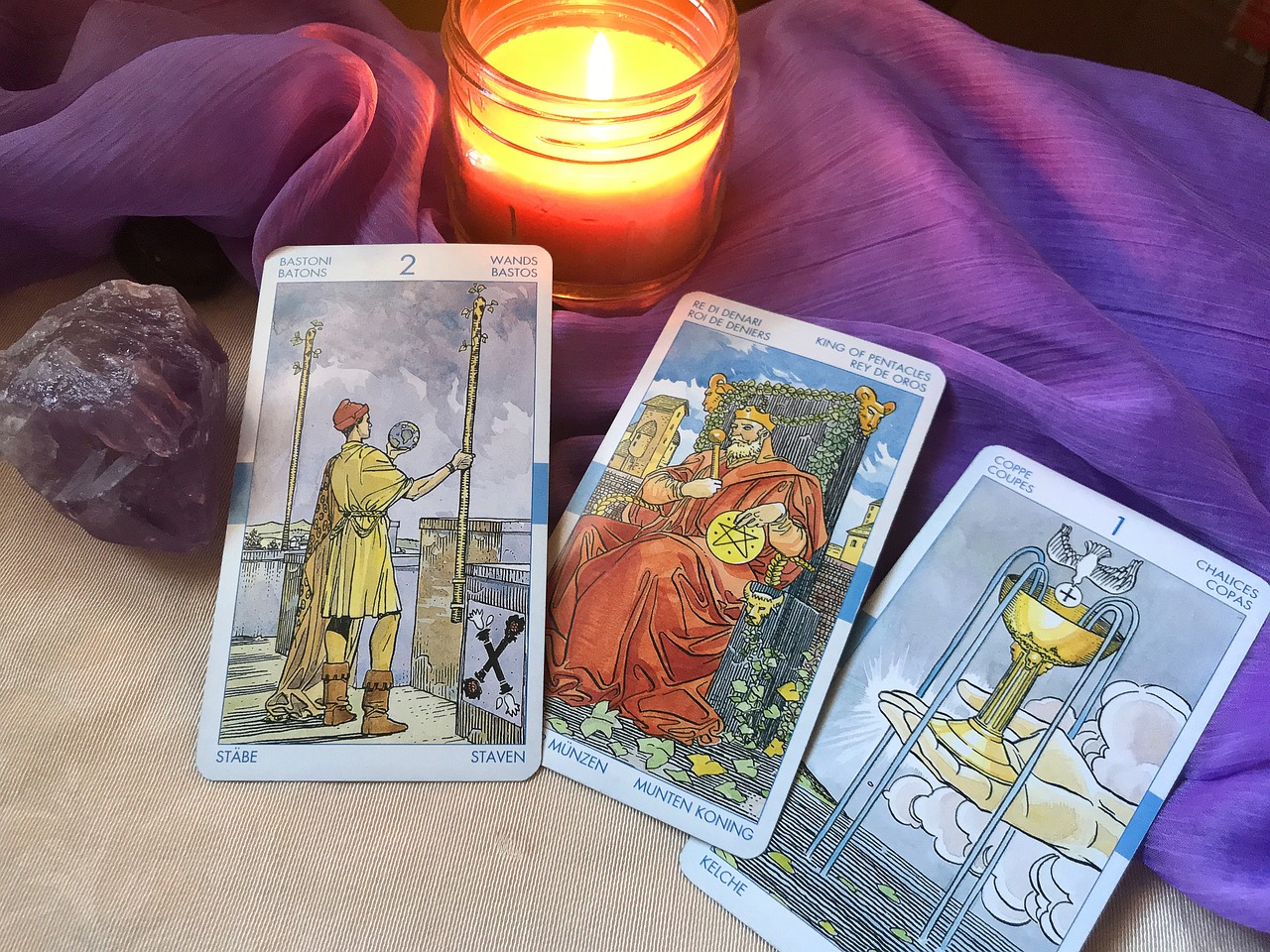
Intuition and Gut Feelings
Have you ever had a moment where you just *knew* something was right or wrong, even when you couldn't explain why? That feeling, often referred to as intuition or a gut feeling, is a fascinating aspect of our unconscious mind. It's like having an internal compass that guides us, even when our conscious mind is still trying to catch up. This phenomenon isn't just a mystical or whimsical notion; it's deeply rooted in our brain's processing abilities.
Intuition arises from a complex interplay of experiences, emotions, and subconscious knowledge. Think of it as a vast library of past experiences stored in your mind. When faced with a decision, your unconscious mind pulls from this library, synthesizing information and providing insights that may not be immediately apparent to your conscious self. This process can be incredibly swift, allowing us to make decisions in the blink of an eye.
Interestingly, research has shown that our gut feelings are often shaped by factors we might not even be aware of. For instance, implicit memories—those memories we acquire without conscious awareness—play a significant role in how we intuitively respond to situations. These memories can stem from personal experiences, cultural influences, or even societal norms. So, when you're hit with a gut feeling, it’s not just random; it’s a culmination of everything you've ever experienced, processed, and stored away.
Moreover, the connection between our emotions and intuition is profound. When we experience strong emotions, our brain becomes more attuned to subtle cues in our environment. This heightened sensitivity can enhance our intuitive abilities, allowing us to detect nuances that may escape our rational thought processes. For example, if you're in a meeting and sense tension in the room, your gut might tell you to hold back on sharing your ideas, even if there's no overt indication that your input wouldn't be welcome.
However, it’s important to remember that while intuition can be a powerful tool, it’s not infallible. Sometimes, our gut feelings can be influenced by biases or emotional states that cloud our judgment. This is where self-awareness comes into play. By reflecting on our intuitive responses and considering the context behind them, we can harness the power of our intuition more effectively. Understanding when to trust your gut and when to seek additional information can make a world of difference in decision-making.
In conclusion, intuition and gut feelings are not just mysterious impulses; they are the result of complex unconscious processes that draw from our vast reservoir of experiences. By recognizing and understanding these feelings, we can enhance our decision-making abilities and navigate through life with greater confidence. So, the next time your gut speaks up, take a moment to listen—it might just be your unconscious mind guiding you toward a better choice.
- What is intuition? Intuition is the ability to understand something immediately, without the need for conscious reasoning. It often feels like a gut feeling.
- How does the unconscious mind influence intuition? The unconscious mind stores past experiences and emotions, which can inform our intuitive responses to new situations.
- Can intuition be wrong? Yes, while intuition can be a helpful guide, it can also be influenced by biases and emotions, leading to incorrect judgments.
- How can I improve my intuition? Engaging in self-reflection, being aware of your emotions, and learning from past experiences can help enhance your intuitive abilities.

The Unconscious and Mental Health
The connection between the unconscious mind and mental health is a profound one, often overlooked in the hustle and bustle of daily life. The unconscious mind acts like an unseen puppet master, influencing our thoughts, emotions, and behaviors in ways we might not even realize. It's like that hidden layer of an iceberg; what we see above the surface is just a fraction of what lies beneath. Unresolved conflicts, repressed emotions, and past traumas can fester in the unconscious, leading to psychological disorders and affecting our overall well-being.
Many individuals experience mental health challenges that stem from these unconscious influences. For example, someone might struggle with anxiety or depression without fully understanding why. Often, these feelings are tied to events or emotions that have been pushed down into the unconscious mind. It’s crucial to recognize that mental health issues are not merely the result of external circumstances; they can be deeply rooted in our unconscious experiences.
To illustrate, let’s consider a few common issues that arise from the unconscious mind:
- Repressed Memories: Traumatic events that are not processed can manifest as anxiety, depression, or even physical symptoms.
- Unresolved Conflicts: Internal conflicts that remain unaddressed can lead to chronic stress and emotional distress.
- Negative Thought Patterns: These often stem from early experiences and can perpetuate feelings of inadequacy or fear.
Addressing these unconscious influences is essential for healing and personal growth. Various therapeutic approaches have been developed to help individuals bring these hidden thoughts and feelings to the surface. For instance, psychoanalysis focuses on exploring the unconscious through techniques like free association and dream analysis. By allowing individuals to express their thoughts freely, therapists can help uncover the root causes of their mental health struggles.
Another effective approach is cognitive-behavioral therapy (CBT), which emphasizes the connection between thoughts, emotions, and behaviors. While CBT primarily focuses on conscious thoughts, it also encourages individuals to explore their underlying beliefs and assumptions, many of which may originate from the unconscious. This exploration can lead to greater self-awareness and ultimately, improved mental health.
Furthermore, the importance of self-reflection cannot be overstated. Taking time to engage in self-reflection can be a powerful tool for uncovering unconscious patterns that may be impacting mental health. Whether through journaling, meditation, or simply taking a moment to pause and think, individuals can begin to peel back the layers of their unconscious mind. This process not only fosters personal growth but also enhances emotional well-being by addressing underlying issues that may have been ignored for too long.
- How does the unconscious mind affect mental health? The unconscious mind can harbor unresolved conflicts and repressed emotions that contribute to mental health issues like anxiety and depression.
- What therapeutic approaches help uncover unconscious thoughts? Psychoanalysis and cognitive-behavioral therapy are two effective methods that help individuals explore and address unconscious influences.
- Can self-reflection improve mental health? Yes, engaging in self-reflection can help individuals identify and address unconscious patterns, leading to better emotional well-being.
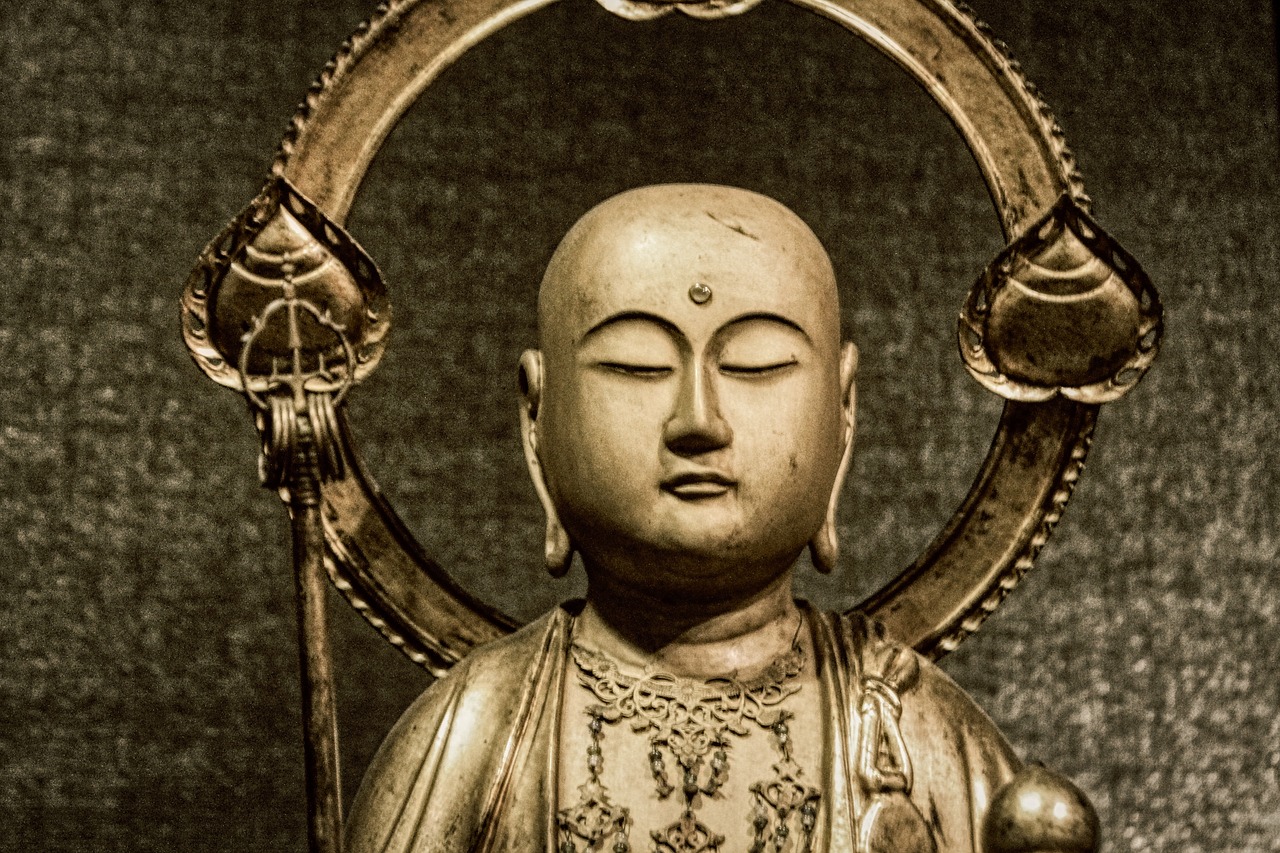
Therapeutic Approaches
When it comes to navigating the intricate maze of the unconscious mind, play a crucial role in helping individuals uncover hidden thoughts and feelings that may be impacting their mental health. These methods are not just about talking; they are about diving deep into the layers of our psyche to bring light to what lurks in the shadows. Have you ever felt a nagging feeling that you couldn’t quite explain? That’s often the unconscious at play, and therapy can help illuminate these dimly lit areas.
One of the most renowned approaches is psychoanalysis, pioneered by Sigmund Freud himself. This method is like peeling an onion—layer by layer, it aims to uncover repressed memories and unresolved conflicts. Through techniques such as free association, where patients express their thoughts without censorship, therapists can tap into the unconscious. It’s fascinating to see how a simple word or image can trigger a cascade of memories, revealing connections that were previously obscured.
Another effective approach is cognitive-behavioral therapy (CBT). While CBT primarily focuses on the conscious mind, it also acknowledges the influence of unconscious processes. By identifying negative thought patterns and behaviors, individuals can begin to understand how their unconscious beliefs shape their reality. For instance, if someone has an unconscious belief that they are unworthy, this may manifest in self-sabotaging behaviors. By challenging these beliefs, CBT empowers individuals to reshape their thoughts and, consequently, their lives.
Additionally, mindfulness-based therapies have gained popularity in recent years. These approaches encourage individuals to cultivate awareness of their thoughts and feelings in the present moment. Mindfulness helps bring unconscious patterns into conscious awareness, allowing for a deeper understanding of oneself. Imagine standing at the edge of a vast ocean, where the surface is calm, but beneath lies a turbulent current. Mindfulness is like diving beneath the surface to explore those currents, providing insights that can lead to profound personal transformation.
Moreover, creative therapies such as art and music therapy can also provide pathways to the unconscious. Engaging in creative expression allows individuals to bypass the barriers of rational thought, often leading to unexpected revelations. For example, a person might paint a scene that reflects their inner turmoil without even realizing it. This spontaneous expression can reveal emotions and conflicts that are difficult to articulate verbally, making it a powerful tool for healing.
As we explore these therapeutic approaches, it’s essential to remember that the journey into the unconscious is not always straightforward. It can be filled with surprises, and sometimes, even discomfort. However, the rewards are immense. By illuminating the dark corners of our minds, we can foster personal growth and improve our mental health. It’s like turning on a light in a dimly lit room; suddenly, everything is clearer, and we can navigate our lives with greater awareness.
In conclusion, whether through psychoanalysis, cognitive-behavioral therapy, mindfulness practices, or creative therapies, the goal remains the same: to bring unconscious thoughts and feelings into the light of consciousness. This journey of self-discovery not only enhances our understanding of ourselves but also paves the way for healing and transformation. So, are you ready to embark on this enlightening journey?
- What is the unconscious mind? The unconscious mind refers to the part of our mind that stores thoughts, memories, and feelings that are not currently in our conscious awareness but still influence our behavior.
- How can therapy help with unconscious issues? Therapy can help individuals uncover and process repressed emotions and thoughts, leading to greater self-awareness and emotional healing.
- What types of therapy focus on the unconscious? Psychoanalysis, cognitive-behavioral therapy, and mindfulness-based therapies are some approaches that address unconscious processes.
- Is it normal to feel uncomfortable during therapy? Yes, it is common to experience discomfort when exploring deep-seated issues, but this can be a vital part of the healing process.

The Importance of Self-Reflection
Self-reflection is more than just a buzzword; it’s a powerful tool that can lead to profound personal growth and emotional well-being. Imagine standing in front of a mirror, but instead of just seeing your physical reflection, you’re also able to glimpse the intricate layers of your thoughts, feelings, and motivations. This process allows you to dive deep into your unconscious mind, uncovering hidden patterns that may be influencing your behavior and decisions. It's like being a detective in your own life, piecing together clues to understand who you are and why you do what you do.
When we take the time to engage in self-reflection, we create a space for introspection that can illuminate our strengths and weaknesses. It’s an opportunity to ask ourselves tough questions: What drives my decisions? Why do I react the way I do in certain situations? By confronting these questions, we can begin to untangle the web of our unconscious motivations. This isn’t just about navel-gazing; it’s about gaining clarity and insight that can lead to more intentional living.
Moreover, self-reflection can be particularly beneficial for mental health. It allows us to address unresolved conflicts and repressed emotions that may have been lurking beneath the surface. When we ignore these feelings, they can manifest in unhealthy ways, impacting our relationships and overall happiness. By shining a light on these hidden aspects of ourselves, we can work towards healing and self-acceptance.
Here are some ways self-reflection can enhance your life:
- Increased Self-Awareness: By understanding your thoughts and feelings, you can make better decisions aligned with your true self.
- Improved Emotional Regulation: Reflecting on your emotions helps you manage them more effectively, reducing impulsive reactions.
- Enhanced Relationships: Understanding your own behavior can lead to better communication and empathy towards others.
- Goal Setting: Self-reflection allows you to evaluate your progress and set meaningful goals for the future.
Incorporating self-reflection into your daily routine doesn’t have to be complicated. It can be as simple as journaling your thoughts at the end of the day, meditating for a few minutes to clear your mind, or even engaging in conversations with trusted friends who can provide insight. The key is consistency; the more you practice self-reflection, the more you’ll uncover about yourself.
In conclusion, self-reflection is an essential practice for anyone looking to unlock the depths of their unconscious mind. It empowers us to confront our inner demons, embrace our true selves, and ultimately lead a more fulfilling life. So, the next time you find yourself caught in the whirlwind of daily life, take a moment to pause, reflect, and reconnect with the incredible person that you are.
- What is self-reflection? Self-reflection is the process of introspection, where individuals examine their thoughts, feelings, and behaviors to gain insight into themselves.
- Why is self-reflection important? It promotes self-awareness, emotional regulation, and personal growth, helping individuals understand their motivations and improve their mental health.
- How can I practice self-reflection? You can practice self-reflection through journaling, meditation, or discussing your thoughts with others.
- How often should I reflect? Regular reflection is beneficial, but even a few minutes a day can make a significant difference.
Frequently Asked Questions
- What is the unconscious mind?
The unconscious mind is a part of our mental processes that operates below the level of conscious awareness. It influences our thoughts, emotions, and behaviors without us even realizing it. Think of it like an iceberg, where only a small portion is visible above the water, while the majority remains hidden beneath the surface.
- How does the unconscious mind affect decision-making?
Our unconscious mind plays a significant role in decision-making by guiding our choices based on intuition and past experiences. Often, we rely on gut feelings that stem from unconscious processing, which can lead to quick judgments without the need for rational thought. It's like having an internal compass that directs us, even when we’re not fully aware of it.
- What are some common defense mechanisms related to the unconscious?
Defense mechanisms are psychological strategies that help us cope with anxiety and protect our self-esteem. Repression is a key mechanism where distressing thoughts are pushed out of conscious awareness. Other mechanisms include denial, projection, and rationalization, all of which serve to shield us from uncomfortable feelings or realities.
- Can dreams reveal unconscious thoughts?
Yes! According to Freud, dreams are a window into the unconscious mind, showcasing hidden desires and conflicts. By analyzing dreams, individuals can gain insights into their deeper psychological issues, much like piecing together a puzzle to understand the bigger picture of one’s psyche.
- What role does self-reflection play in understanding the unconscious?
Self-reflection is crucial for uncovering unconscious patterns and beliefs. By taking the time to reflect on our thoughts and behaviors, we can identify underlying issues that may be affecting our mental health. It’s like shining a flashlight into the dark corners of our mind, illuminating aspects we might not have been aware of before.
- How can therapy help with unconscious issues?
Therapeutic approaches like psychoanalysis and cognitive-behavioral therapy aim to bring unconscious thoughts and feelings to the surface. This process promotes healing and self-awareness, allowing individuals to address unresolved conflicts and repressed emotions, ultimately leading to improved mental health.
- What is implicit bias and how does it relate to the unconscious mind?
Implicit bias refers to the attitudes or stereotypes that unconsciously affect our understanding, actions, and decisions. These biases can lead to unintended consequences in social interactions and decision-making, highlighting how deeply ingrained unconscious influences can shape our perceptions of others.


